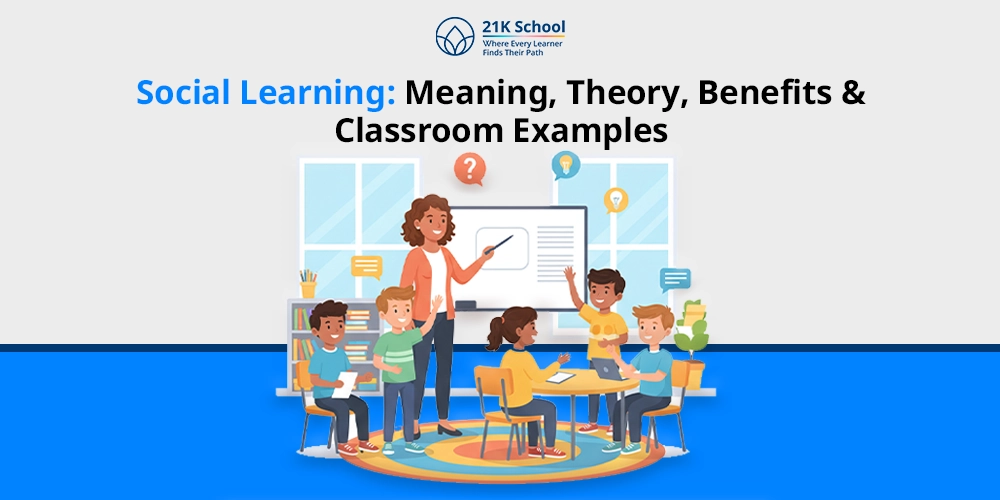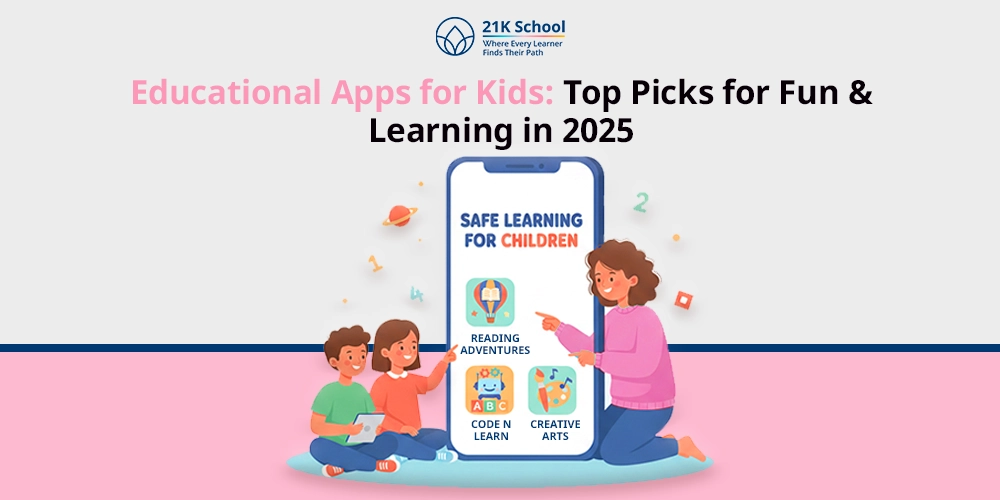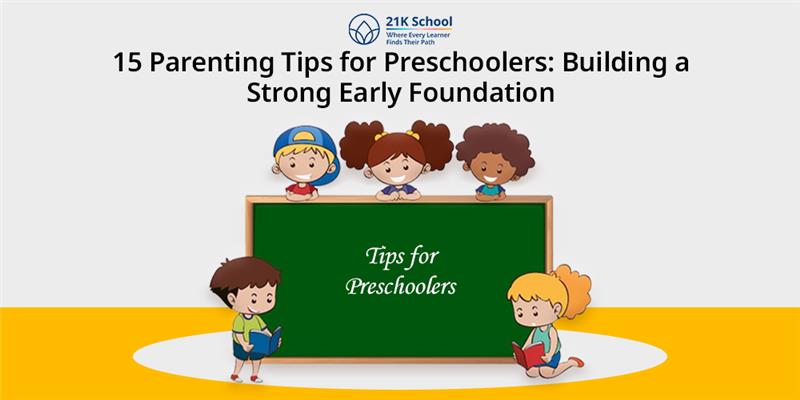
Have you ever thought about how parents play an essential role for preschoolers?
Parents can encourage their kids to learn in a positive way. Preschools are interesting, curious and allow students to socialise with others. Parenting a preschooler allows kids to develop social skills and learn new concepts more confidently.
Positive parenting among kids helps in developing discipline , emotional intelligence, healthy habits, and communication skills . Preschools are the early stage of education, which includes students of age between 3 to 6.
Preschools create a foundation for students, enabling them to understand real-life concepts. Preschools focus on enhancing the social skills as well as the cognitive development of children.
During this stage, kids are being exposed to new ideas, developing social skills and adjusting to being away from their parents. Parents’ support, guidance and encouragement also play an important role in enhancing the confidence and attention among kids.
Contents
- What is Parenting Style for Preschoolers?
- 15 Parenting Tips for Preschoolers: Building a Strong Early Foundation
- 1. Don’t Yell at Your Kids
- 2. Encourage Students
- 3. Be a Positive Role Model
- 4. Set a Routine
- 5. Foster Relationship
- 6. Teach them Discipline
- 7. Promotes Exploration
- 8. Use Positive Language
- 9. Set Limits
- 10. Encourage Social Skills
- 11. Support Games and Sports
- 12. Set a Screen Limit
- 13. Create a Positive Home Environment
- 14. Help Kids with Homework
- 15. Listen Actively
- Benefits of Parenting Tips for Preschoolers
- Conclusion
What is Parenting Style for Preschoolers?
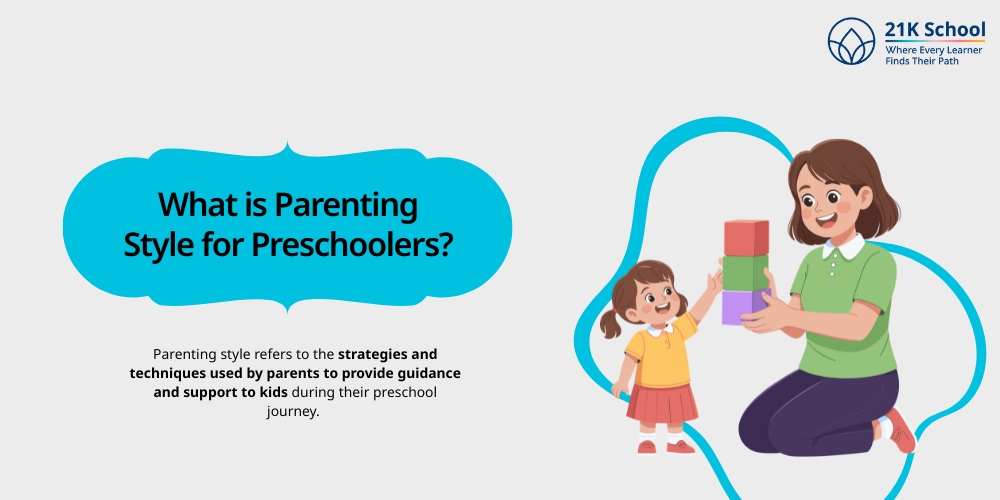
Parenting style refers to the strategies and techniques used by parents to provide guidance and support to kids during their preschool journey. Throughout their childhood, children go through a variety of stages.
Parents combine a variety of elements that change over time to create their own parenting philosophies. As children start to form their own personalities, parenting approaches may also change.
Proper parenting is essential for promoting a positive learning environment that allows children to develop good habits and discipline.
A proper parenting style is necessary to control personalities among students, as sometimes yelling at kids also hampers their behaviour, which causes them to develop poor skills.
15 Parenting Tips for Preschoolers: Building a Strong Early Foundation
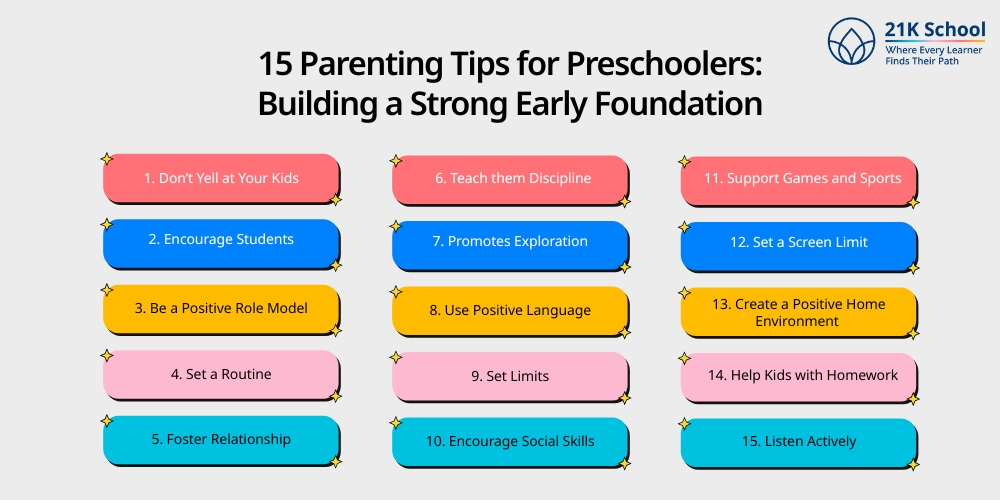
Parenting tips are the techniques prepared or followed by parents to support kids. Proper parenting style allows kids to focus on their education as well as explore the world more closely.
A proper and positive parenting allows preschoolers to develop confidence and attention among kids enabling them to enhance their knowledge retention. Here are the mentioned parenting tips for preschoolers.
1. Don’t Yell at Your Kids
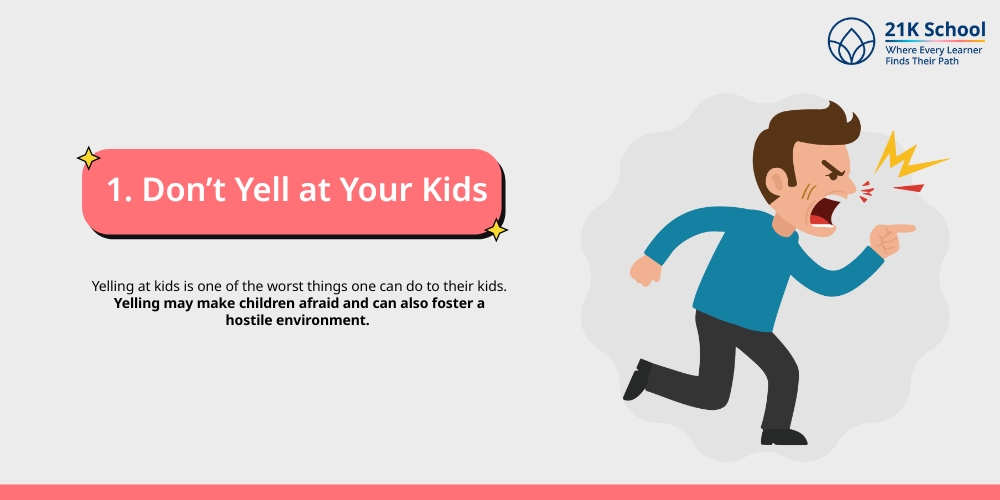
Yelling at kids is one of the worst things one can do to their kids. Yelling may make children afraid and can also foster a hostile environment. Instead of speaking loudly or yelling speak quietly to kids as they are sensitive at such age.
Children are more likely to pay attention and understand when parents speak softly and clearly.
It encourages them to express their feelings without fear of repercussions and makes them feel safer. By demonstrating emotional control, it also teaches them how to deal with their own frustrations.
2. Encourage Students
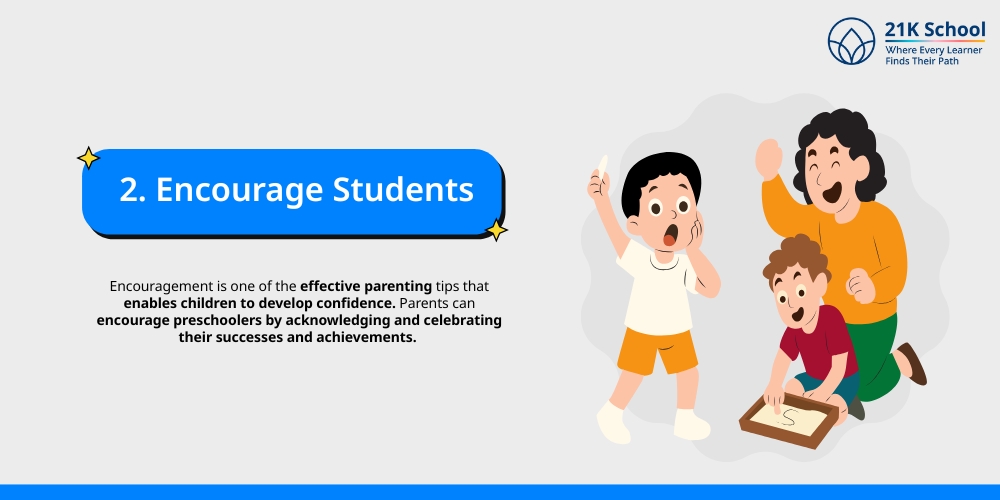
Encouragement is one of the effective parenting tips that enables children to develop confidence. Parents can encourage preschoolers by acknowledging and celebrating their successes and achievements.
Encouraging kids over small things helps kids to develop good behaviour and enhances creative thinking skills . This not only boosts their confidence but also cultivates a love of learning and exploration, which makes them more willing to take on new challenges.
3. Be a Positive Role Model
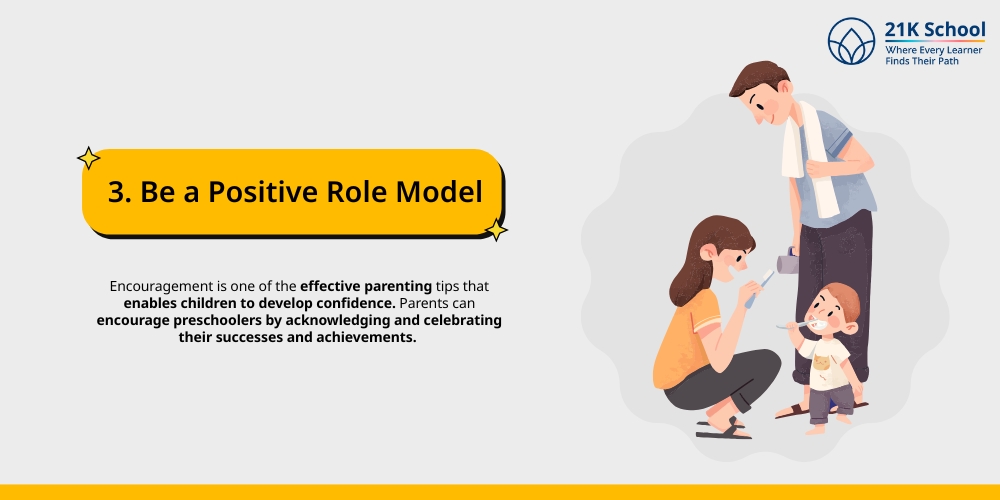
As good observers, children often imitate the behaviour of adults. When parents act with qualities like patience, kindness and respect, they set an example for preschoolers to follow.
Parents can teach kids to be compassionate toward others, express their emotions in a healthy way and settle disputes positively. Your deeds speak louder than words so set a good example for them that will serve them well throughout their lives.
4. Set a Routine
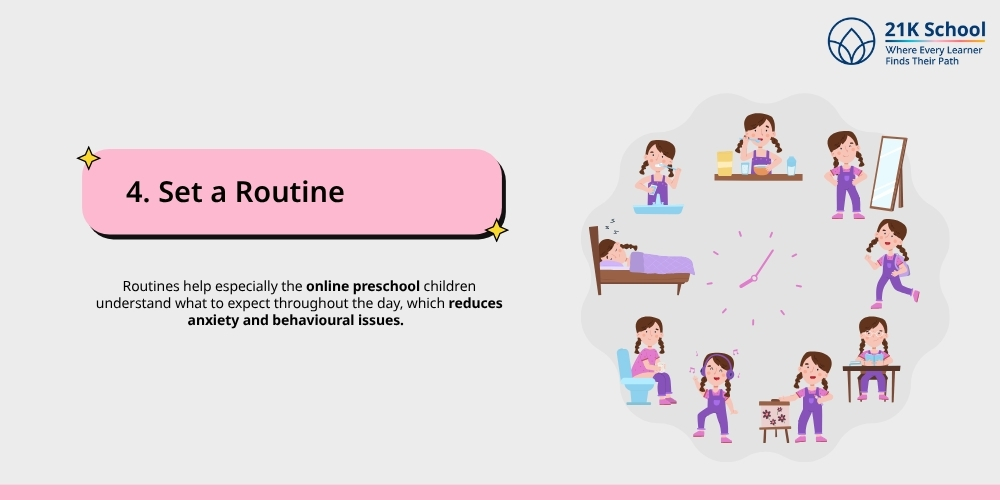
Establishing a daily routine gives young children the structure and predictability they need. Routines help especially the online preschool children understand what to expect throughout the day, which reduces anxiety and behavioural issues.
Establish consistent times for eating, playing, studying and sleeping. Along with giving children a sense of security, this teaches them time management skills and the importance of responsibility.
5. Foster Relationship
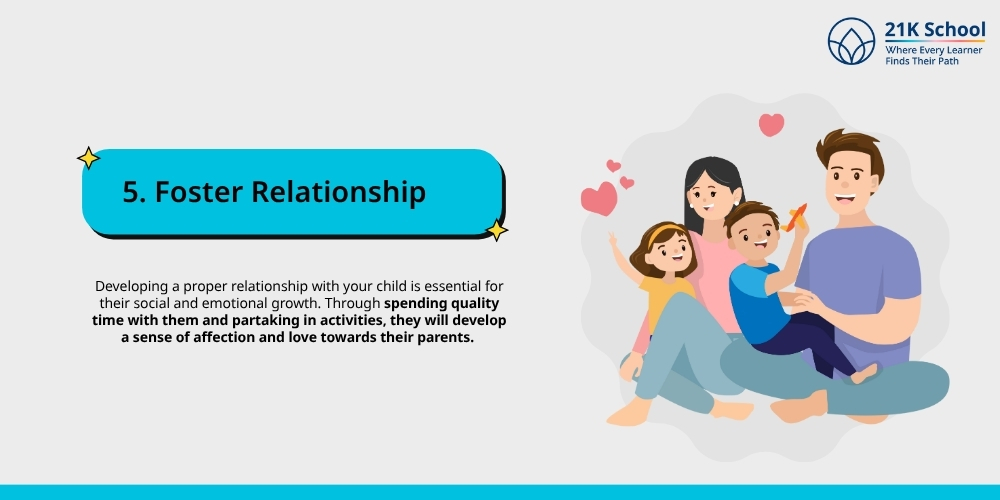
Developing a proper relationship with your child is essential for their social and emotional growth. Through spending quality time with them and partaking in activities, they will develop a sense of affection and love towards their parents.
A proper relationship helps in developing trust and open communication through which they will feel more comfortable and can talk about their challenges and hindrances.
This also helps in developing empathy and allows children with strong relationships as they learn to navigate their interactions with others.
6. Teach them Discipline
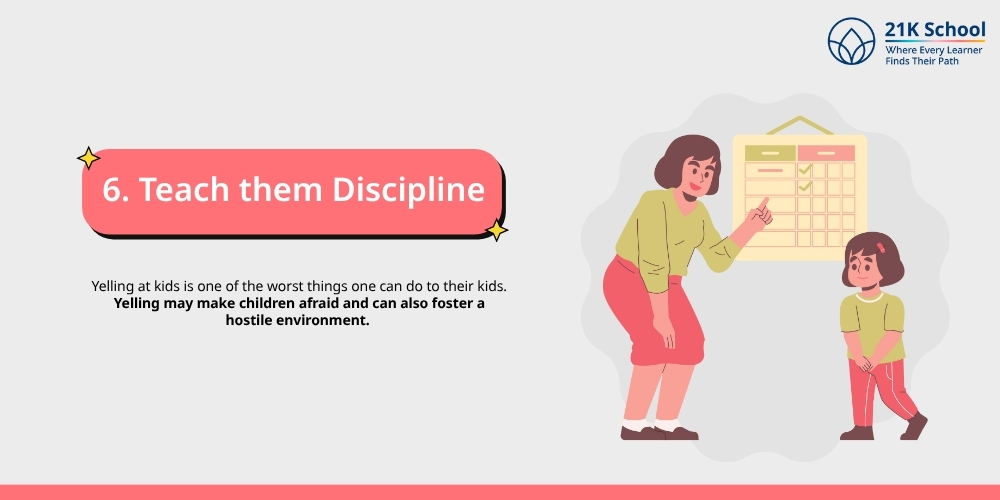
Proper discipline is very essential for effective behaviour among childrens. Teaching students with discipline is more effective than yelling at them.
It is ideal for parents to use age-appropriate teaching methods to help children understand the consequences of their actions. This method promotes self-control and enables them to grow from their mistakes, which eventually results in improving behaviour.
7. Promotes Exploration
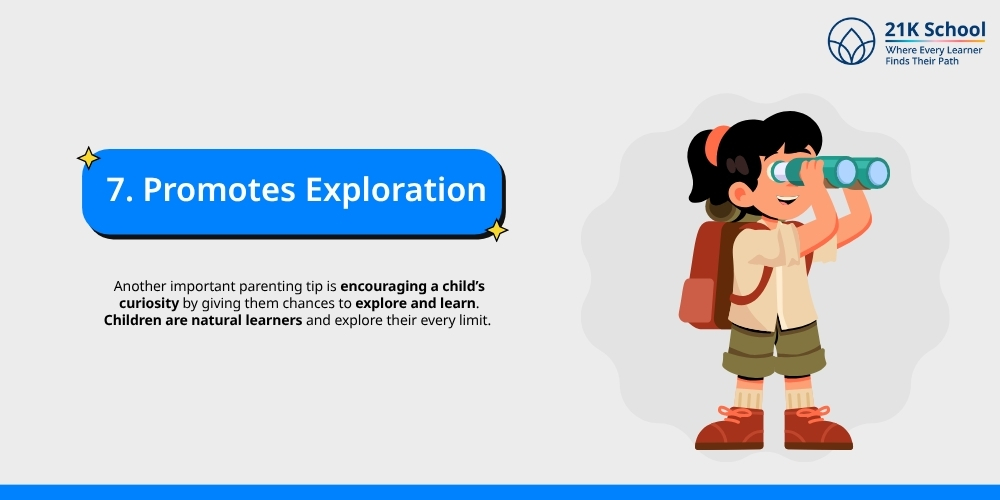
Another important parenting tip is encouraging a child’s curiosity by giving them chances to explore and learn. Children are natural learners and explore their every limit.
Parents should create a secure space where they can ask questions, try new things and explore nature. Involving kids in nature hikes, crafts, and easy science experiments is a great way to start exploration.
Encouraging exploration helps them develop creativity, critical thinking skills and problem-solving techniques .
8. Use Positive Language
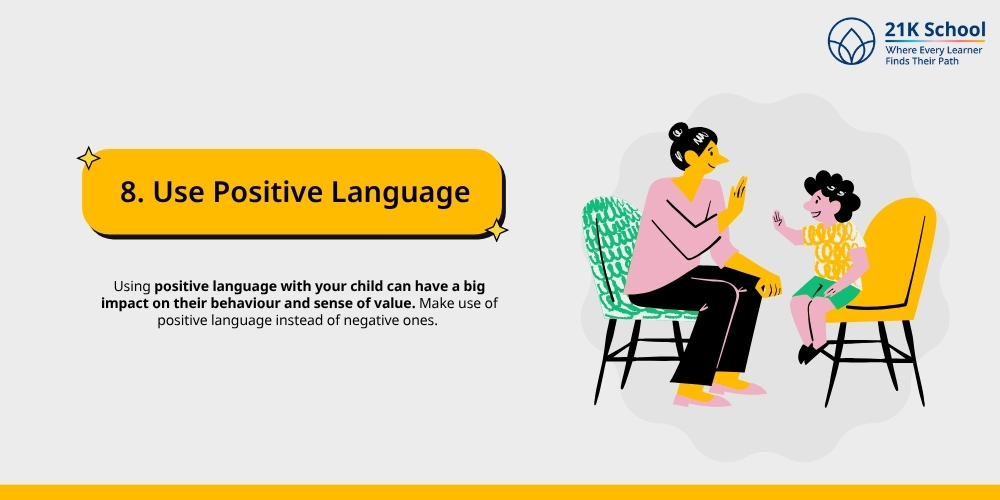
Communication with children using positive language is essential. Using positive language with your child can have a big impact on their behaviour and sense of value. Make use of positive language instead of negative ones.
By giving children a clearer understanding of expectations and rewarding good behaviour, this approach makes it more likely that they will develop feelings of belongingness.
9. Set Limits
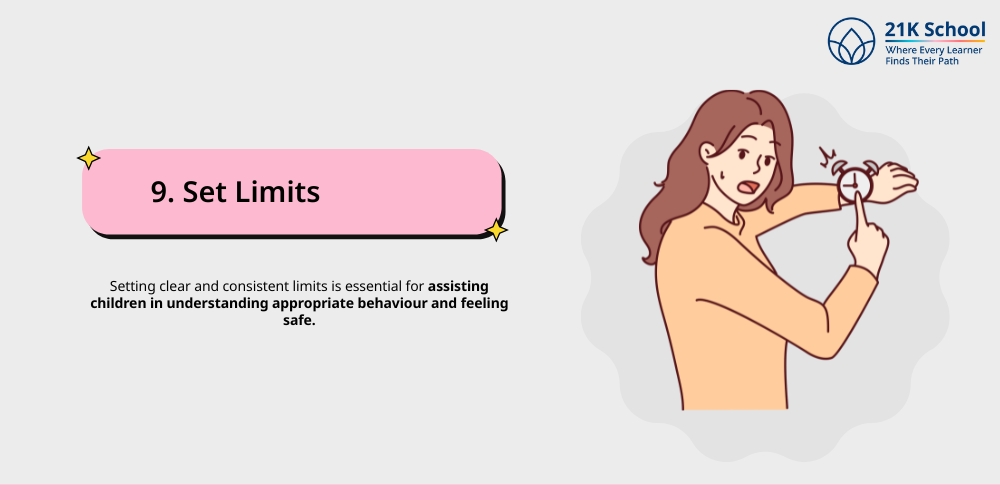
Setting clear and consistent limits is essential for assisting children in understanding appropriate behaviour and feeling safe. Apply the rules consistently while providing a clear explanation of them and their rationale.
This is important for children’s development at home and in social settings because it teaches them responsibility and the importance of following rules.
10. Encourage Social Skills
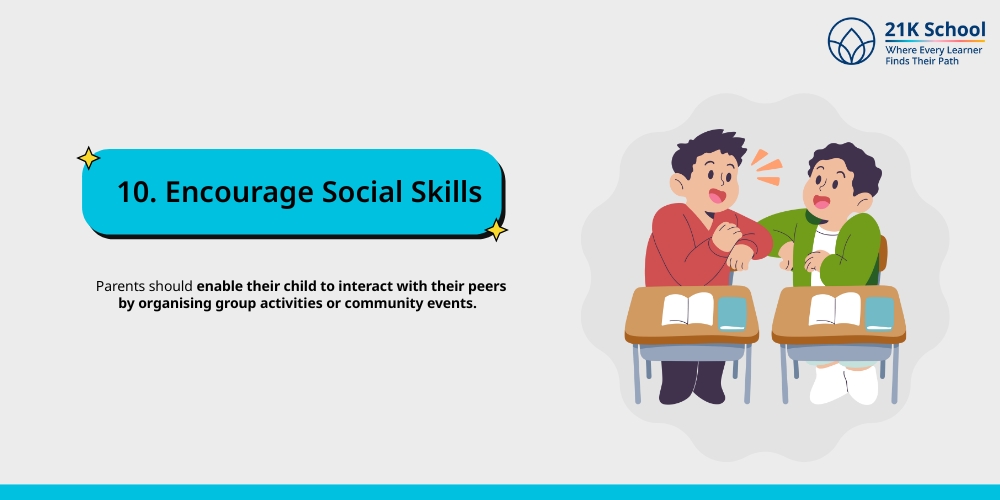
Social skills are essential for children’s growth and future achievements. Parents should enable their child to interact with their peers by organising group activities or community events.
Parents can teach children with basic skills like expressing emotions, appropriately sharing, and affection. Role-playing for different social situations can also assist them in practising these abilities in a positive learning environment, preparing them for interactions in real life.
11. Support Games and Sports
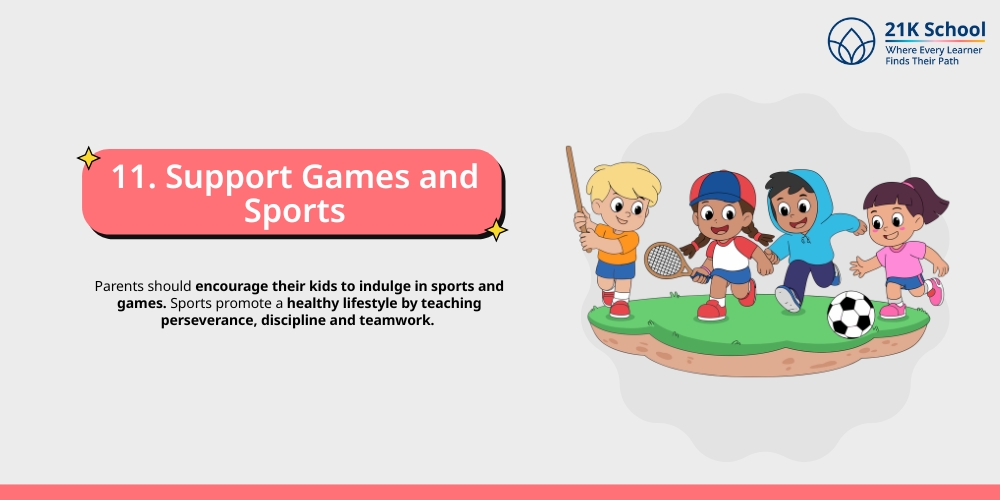
Games and sports are an important part of students’ lives. Parents should encourage their kids to indulge in sports and games. Sports promote a healthy lifestyle by teaching perseverance, discipline and teamwork.
Parents should encourage their child to participate in a range of activities so they can discover their interests and feel like they fit in with the group.
Most preschool courses on playful approaches of learning allow students to learn through games and enhance .
12. Set a Screen Limit
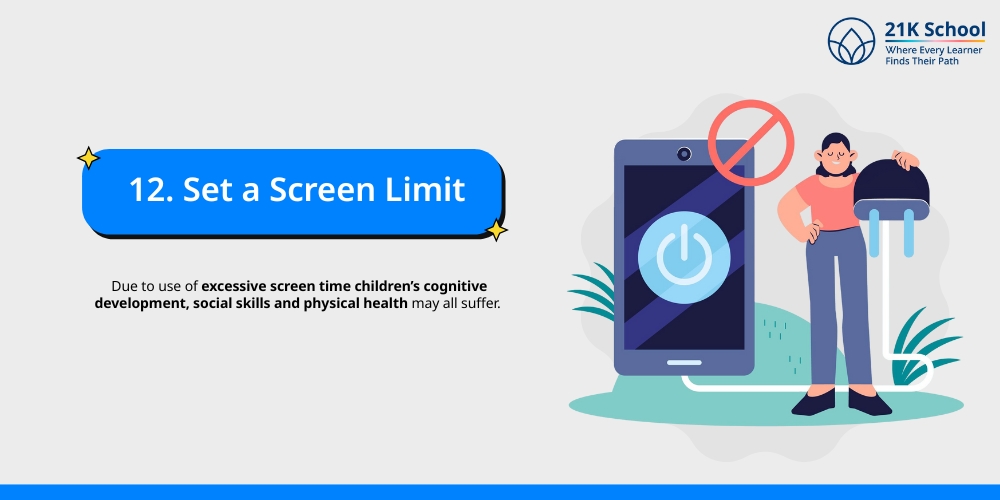
It is important for parents to supervise and restrict young in the current digital era. Due to use of excessive screen time children’s cognitive development, social skills and physical health may all suffer.
Give them precise rules about how long and when they can use phones and support them in reading, playing outside or working on creative projects that encourage participation and interaction.
13. Create a Positive Home Environment
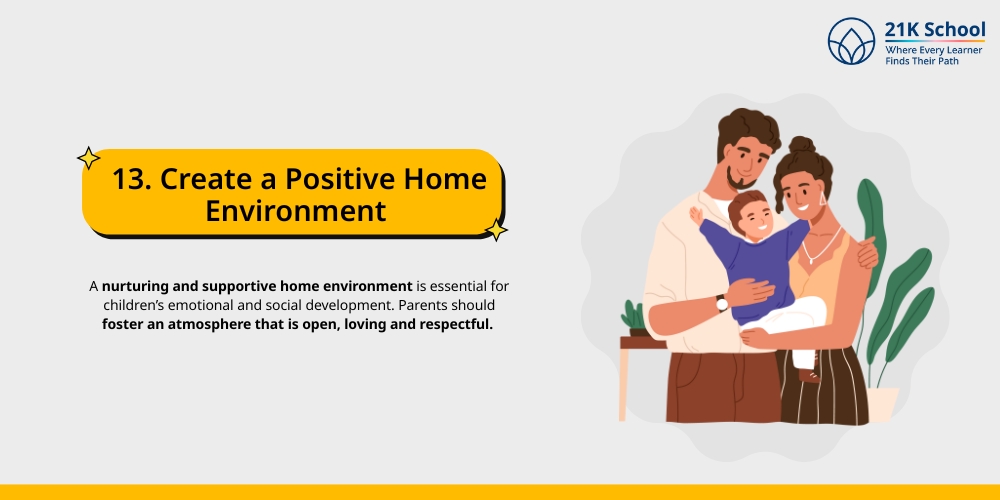
A nurturing and supportive home environment is essential for children’s emotional and social development. Parents should foster an atmosphere that is open, loving and respectful.
Encourage family discussions, recognize achievements and provide support when times are difficult. Children’s overall well being depends on a healthy home environment because it gives them a sense of security and value.
14. Help Kids with Homework
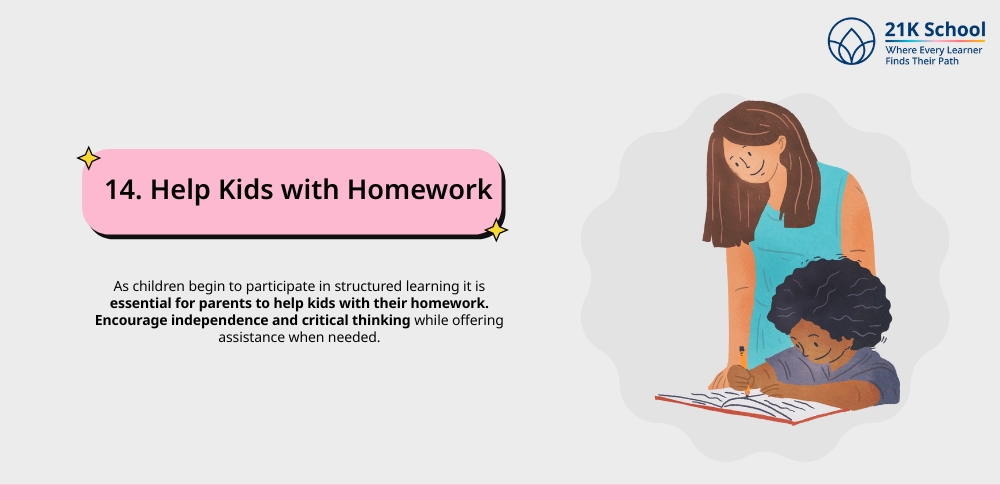
As children begin to participate in structured learning it is essential for parents to help kids with their homework. Encourage independence and critical thinking while offering assistance when needed.
To help them develop efficient study habits and time management skills, set up a dedicated study space and study routine . Their learning is strengthened and they feel more confident in their abilities.
15. Listen Actively
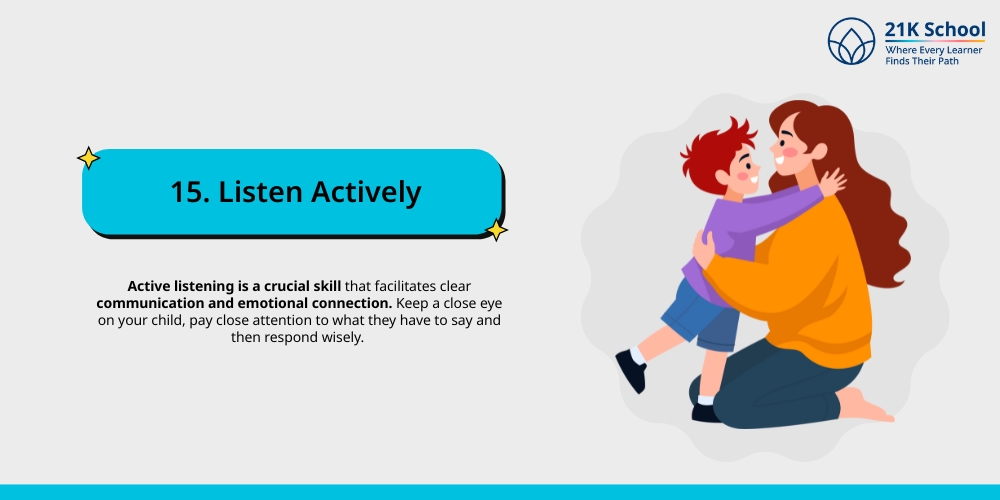
Active listening is a crucial skill that facilitates clear communication and emotional connection. Keep a close eye on your child, pay close attention to what they have to say and then respond wisely.
Tell them you appreciate their opinions and validate their feelings and thoughts. Active listening helps in enhancing children’s emotional intelligence and relationship with parents. This also promotes open communication and helps them feel appreciated and understood.
Benefits of Parenting Tips for Preschoolers
Parenting tips among preschoolers are very important to enhance the overall development of students. A proper parenting tips helps in enhancing students motivation and allows them to develop good behaviour.
It is essential for parents to provide proper steps and guidance to preschoolers as at an early age children are very sensitive. Young kids love to explore the world and parents can help them to explore the possibilities. Here is why parenting tips are essential for preschoolers.
1. Promotes Parent-Child Relationship
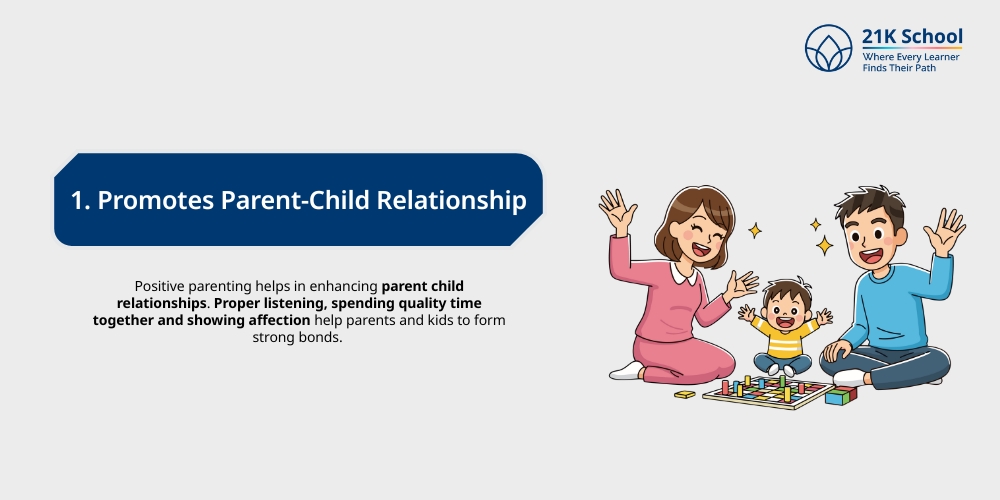
Positive parenting helps in enhancing parent child relationships. Proper listening, spending quality time together and showing affection help parents and kids to form strong bonds.
This relationship is crucial for a child’s emotional development as it fosters trust and a sense of security among them. Emotional intelligence and resilience are enhanced when children feel connected to their parents which increases their likelihood of asking for assistance and speaking honestly.
2. Boost Self-Confidence
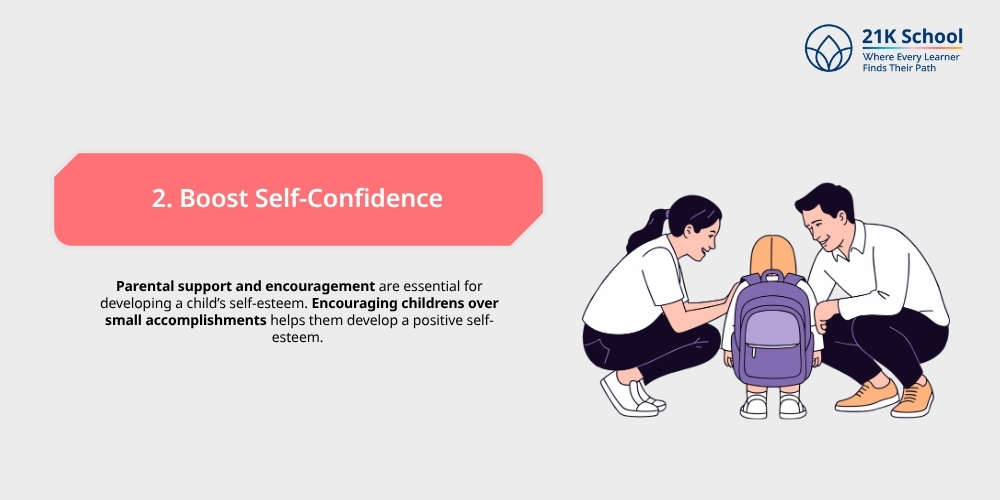
Parental support and encouragement are essential for developing a child’s self-esteem. Encouraging childrens over small accomplishments helps them develop a positive self-esteem.
Children who receive this support are encouraged to try new things, take chances and learn from their mistakes and see failure as opportunities. They consequently grow more self-reliant and open to pursuing their interests and skills.
3. Promotes Healthy Habits
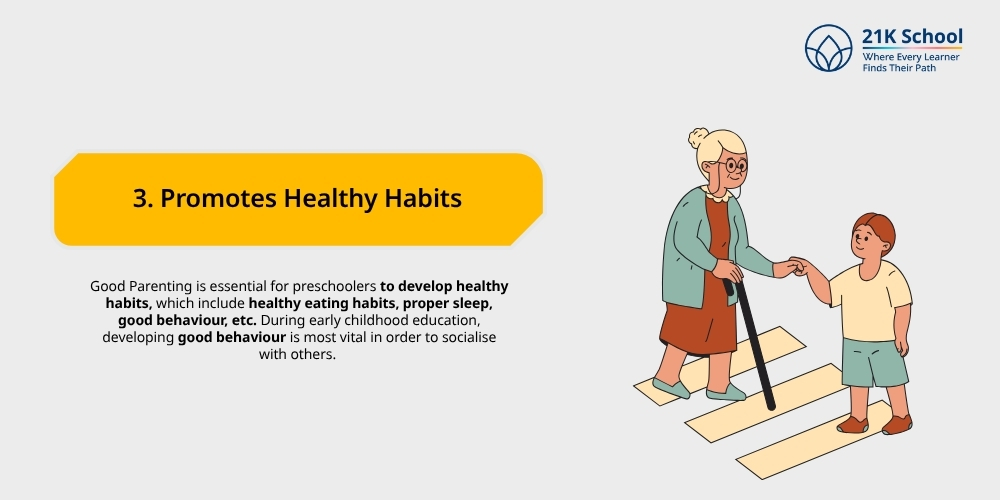
Good Parenting is essential for preschoolers to develop healthy habits, which include healthy eating habits, proper sleep, good behaviour, etc. During early childhood education, developing good behaviour is most vital in order to socialise with others.
Proper parenting helps in developing social-emotional learning among preschoolers. Parents can encourage kids to indulge in social skills, making a proper bedtime routine also promotes healthy sleep among kids.
4. Reduce Negative Behaviour
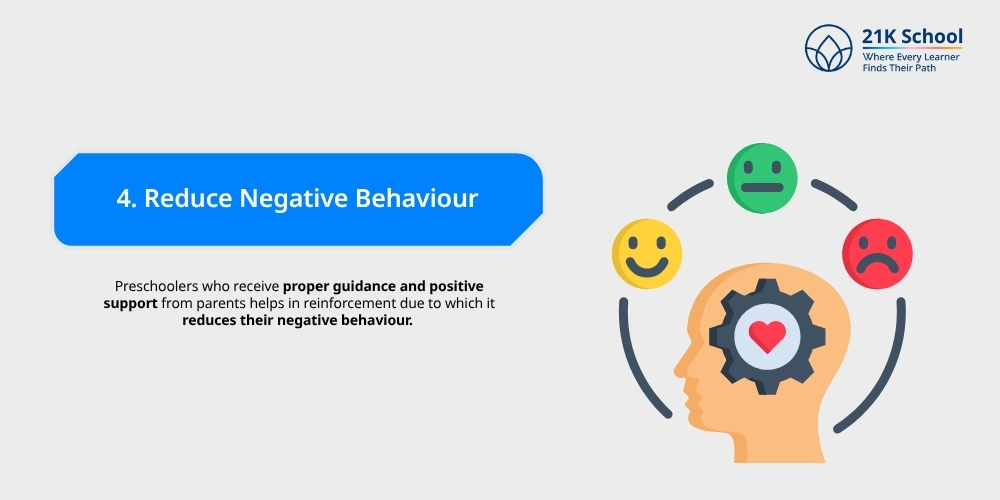
Preschoolers who receive proper guidance and positive support from parents helps in reinforcement due to which it reduces their negative behaviour.
Parents can assist their children in developing emotional control and effective communication skills by emphasising the teaching of appropriate behaviours rather than just yelling at kids.
5. Enhance Social Skills
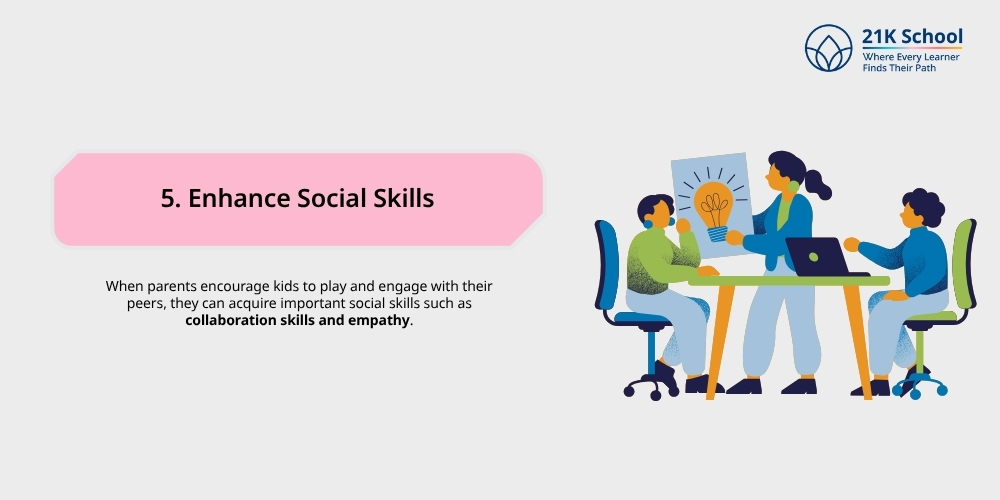
When parents encourage kids to play and engage with their peers, they can acquire important social skills such as collaboration skills and empathy. In their future relationships these abilities will be crucial. Through role-playing games and group activities, kids are given the chance to practice these skills in a supportive environment.
Conclusion
Fostering a child’s overall development during the preschool years requires effective parenting. Parents can foster a nurturing environment that improves their child’s social skills, emotional intelligence and self-confidence by putting positive parenting advice into practice.
The key tactics for guiding children through their early experiences and laying a solid foundation for future learning are encouraging active listening and establishing clear boundaries.
Preschoolers learn about the world around them and their behaviour and attitudes are greatly influenced by their parents’ support and direction. This eventually results in better relationships and healthier habits.
Parents can have a big impact on their child’s development and well-being and put them on the path to success in life by devoting time and energy to their parenting style.

